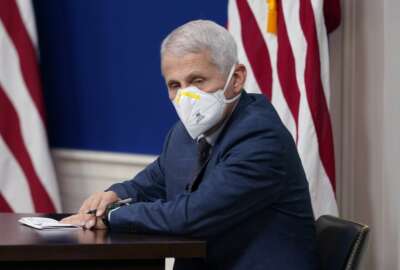
Man faces decade in prison for threatening some prominent federal employees
In today's Federal Newscast, a West Virginia man is facing punishment, including up to 10 years in jail, for making multiple threats against federal officials.
To listen to the Federal Newscast on your phone or mobile device, subscribe in PodcastOne or Apple Podcasts. The best listening experience on desktop can be found using Chrome, Firefox or Safari.
- A West Virginia man is facing punishment, including up to 10 years in jail, for making multiple threats against federal officials. The Justice Department said 56-year-old Thomas Patrick Connally, Jr., pled guilty to sending threatening emails to Dr. Anthony Fauci, the current Director of the National Institute of Allergy and Infectious Diseases and the Chief Medical Advisor to the President as well as to former National Institutes of Health Director Frances Collins and Dr. Rachel Levine, currently the assistant secretary for health at the Department of Health and Human Services. From December 2020 to July 2021, Connally admitted to sending the threats with the intent to intimidate or interfere as well as retaliate against these federal officials for their efforts around COVID-19 and its testing and prevention.
- The IRS workforce ramped up telework since the start of the COVID-19 pandemic, but is still resolving some loose ends. Telework at the IRS peaked in January 2021 with about 65,000 employees taking at least some level of telework. The IRS temporarily waived some telework requirements at the start of the pandemic. But as of this March, more than 3,000 IRS employees continue to log telework hours, but don’t have a telework agreement in place and haven’t taken mandatory telework training. The IRS, as part of its office reentry plans, required all employees without a telework agreement to work in the office full-time starting May 8.
- Starting tomorrow, for a brief period, Thrift Savings Plan participants won’t be able to change investments. On June 1, TSP will launch a new mobile app. The update, called “Converge,” has new features like enhanced security, a live chat window and electronic signatures. Most participants *don’t* need to take action before the downtime. But if they choose to, they can complete transactions, download documents from My Account and check investments before May 26. Those features will all be available again in the first week of June.
- Once again, federal employees will get to share how satisfied and engaged they feel in their jobs. The 2022 Federal Employee Viewpoint Survey is returning to its original late spring timeline this year. The Office of Personnel Management will send the survey to agencies in two rounds: on May 30 and June 6. OPM will add new questions, asking more about initiatives for equity, resiliency and work quality. Employees can also share thoughts on telework and their well-being after COVID-19. To try to improve response rates, OPM asked agencies to let their employees know now about the upcoming survey.
- The FBI announced two key leadership selections. Brian Turner will serve as the bureau’s associate deputy director. He’ll oversee all FBI personnel, budget, administration, infrastructure, compliance, insider threat, and diversity and inclusion programs. Turner was most recently executive assistant director of the Criminal, Cyber, Response and Services Branch. The FBI also named Larissa Knap as executive assistant director of the National Security Branch. Knapp most recently led the FBI’s Human Resources Branch.
- The Department of Veterans Affairs is asking employees to come up with some innovative ideas. The VA Innovation Unit is launching its first ever VAIU Challenge. The virtual event will run from June 8 through June 10. It will give VA employees the chance to design a proof of concept to propose and build solutions that enhance veteran and employee experiences at the VA. Participants can learn more about VA-wide challenges and win innovation funding from the Office of Information and Technology. The event is open to all VA employees.
- Congress digs into the Technology Modernization Fund today. The General Services Administration and Agriculture Department make their case to the House Oversight and Reform Committee about the impact of the TMF. USDA CIO Gary Washington said the agency is on track to pay back three of the loans from the TMF Board between 2023 and 2029. It’s unclear if the two other projects USDA received funding for will result in loan repayment. Meanwhile, Raylene Yung, the executive director of the TMF program management office, said the 12 investments totaling nearly $400 million from the funding in the American Rescue Plan Act is having a significant impact on areas like cybersecurity and customer service.
- The Postal Service’s inspector general office is about to get even busier. The USPS IG office told Congress that the Postal Service Reform Act signed into law last month expands the IG’s office to now cover the Postal Regulatory Commission. The USPS IG said her office completed nearly 1,500 investigations between October 2021 and March 2022. Those investigations led to nearly 450 arrests and more than $113 million in fines and recoveries. USPS received about $14 million on the money recovered.
- The Army said it is conducting an investigation into Balfour Beatty Communities after a Senate Committee report found continued inaccurate work orders and repair requests. Permanent Subcommittee on Investigations leaders Jon Ossoff (D-Ga.) and Ron Johnson (R-Wisc.) are calling on the Defense Department to provide more information about how the military can improve oversight of housing companies. Balfour Beatty pleaded guilty to fraud against all three military services last year.
- The commission to rename military bases reveals a few of its suggestions ahead of its final report release. The new names range from abstract ideas to legendary generals. The Naming Commission, which is tasked with recommending new monikers for bases commemorating Confederate officers, released its suggestions for nine Army bases. Fort Bragg in North Carolina would be renamed Fort Liberty. Fort Gordon in Georgia would be renamed after former President and Supreme Allied Commander Dwight D. Eisenhower. Fort A.P. Hill in Virginia would take on the name of Civil War medic Dr. Mary Walker.
- Climate Action 2030 is the latest plan from the Navy and Marine Corps to set them on a path to net-zero greenhouse gas emissions by 2050. The Navy said the strategy will also help the branches become more capable, agile and lethal fighting forces. Targets and goals in Climate Action 2030 include reducing emissions, reducing energy demand while increasing carbon pollution-free electricity at installations and bases.
Copyright © 2025 Federal News Network. All rights reserved. This website is not intended for users located within the European Economic Area.
Eric White
Eric White is news anchor and Federal Drive producer at Federal News Network.
Follow @FEDERALNEWSCAST
Related Stories





